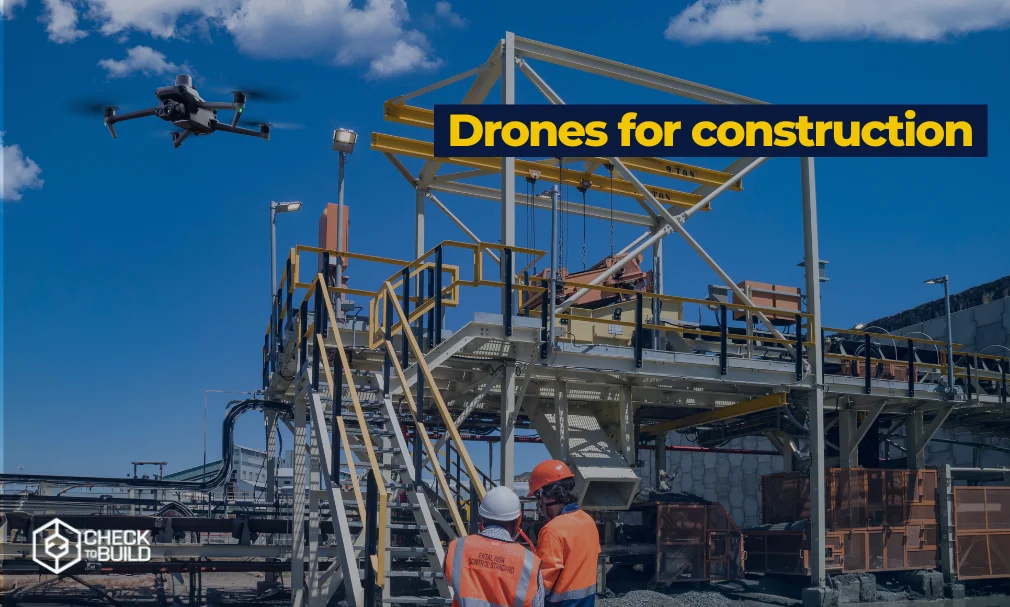In recent years, drones have made a significant impact on various industries, and construction is no exception. Equipped with advanced imaging and flight capabilities, and automation functions, drones are transforming the way construction sites are monitored and managed.
As projects become more complex and time-sensitive, effective site monitoring is crucial for ensuring timely completion, profitability, and safety compliance. In this article, we’ll dive into the advantages of using drones in construction, explore remote site monitoring, examine the types of applications in the construction industry, discuss key features and capabilities of drone technology, and envision the future.
Advantages of Using Drones for Construction
1-Enhanced Safety and Risk Mitigation
Drones offer a safer alternative to traditional inspection methods by eliminating the need for personnel to access hazardous areas themselves. Equipped with advanced sensors, drones can detect potential safety risks early, such as structural issues or equipment malfunctions, allowing construction teams to address problems promptly and maintain a safe working environment.
2-Cost Savings and Time Efficiency
Drone technology streamlines the inspection process, leading to substantial cost savings and increased efficiency. They reduce the need for expensive equipment and time-consuming manual labor, allowing for quicker inspections and data collection. Research indicates that drones can save construction companies about $5 million per day by preventing downtime.
3-Remote Site Monitoring
Remote site monitoring has become increasingly important in the construction industry, and drones play a pivotal role in this aspect. Drones equipped with high-resolution cameras and sensors can perform aerial inspections of pipelines, oil and gas facilities, and infrastructure, providing visual documentation, accurate mapping, and data analysis. This remote monitoring capability allows construction companies to access real-time information, enhance communication and collaboration among project teams, and make informed decisions promptly from a distance.
Types of applications of drones in the construction industry
1-Pipeline Inspections
Drones equipped with high-resolution cameras and sensors can conduct aerial inspections of large pipelines, detecting leaks, corrosion, or structural damage. They provide visual documentation, accurate mapping, and data analysis, or even point clouds, aiding in maintenance and asset integrity management.
2-Facility and Infrastructure Inspections
Drones enable efficient and safe inspections of oil and gas facilities, capturing high-resolution imagery for detailed visual assessments, identification of maintenance needs, and compliance monitoring.
3-Environmental Monitoring
They are used for environmental monitoring, such as monitoring spills, identifying vegetation encroachments, or assessing wildlife impact. This aids in environmental impact assessments, regulatory compliance, and proactive environmental management.
4-Emergency Response and Incident Management
During emergencies like oil spills or industrial incidents, drones provide rapid and real-time situational awareness, capturing high-resolution imagery, assessing damages, and facilitating decision-making for effective response and mitigation strategies.
The future
As technology continues to advance, the potential is poised to grow even further. Embracing this transformative technology will undoubtedly provide construction companies with a competitive edge in the modern business landscape. With ongoing developments in drone capabilities, such as improved autonomy, longer flight times, and enhanced data processing capabilities, will continue to revolutionize the way construction sites are monitored, managed, and maintained.
In conclusion, drones have emerged as invaluable tools in the construction industry, offering enhanced safety, cost savings, and improved operational efficiency. By leveraging the capabilities of drones for construction site monitoring, companies can streamline processes, reduce downtime, and ensure compliance with safety regulations. As the technology evolves, drones will play an increasingly vital role in shaping the future of construction. So, let’s embrace the future together and soar above our competitors with drones for construction!

